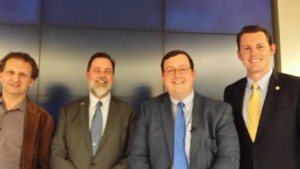Sen. McKoon, Jeff Graham, Others Debate Georgia’s RFRA Bill
Photograph by Gloria Tatum, Senior Staff Writer.
(APN) ATLANTA — The first RFRA (Religious Freedom Restoration Act) debate of the year has arrived, even before any of the grandstanding of the 2016 Legislative Session has even begun.
The two most vocal players–State Sen. Josh McKoon (R-Columbus) and Georgia Equality Executive Director Jeff Graham–were present, along with recently-elected State Rep. Taylor Bennett (D – Brookhaven) and Emory Law Prof. Alexander Volokh, at a panel discussion hosted by the American Constitution Society Georgia Lawyer Chapter, held at the offices of Bondurant Mixson & Elmore on Wednesday, January 06, 2016.
As previously reported by Atlanta Progressive News, Georgia’s RFRA proposal would purport to change the standard by which courts evaluate lawsuits brought by individuals who seek exemptions from existing laws due to their religious beliefs.
Both McKoon and Graham used many of the same, polished arguments they’ve brought out over the past few years this issue has been active.
“The entire purpose of the Religious Freedom Restoration Act is to restrain the power of government to mistreat people of faith,” McKoon said during the panel discussion.
Graham spoke about what appears to be the real, anti-gay agenda that many of the organizations backing RFRA bring to the table.
“Frankly, I’m afraid of the process. I am afraid of the hatred that spews out there. I don’t accuse Sen. McKoon of hatred, but the folks, the other organizations that have been backing this bill, I do know that they do not want me to have the same legal guarantees and protection that other people currently enjoy in Georgia,” Graham said.
“That’s what scares me, that’s the political process that scares me,” Graham said.
A new piece of the debate starting to gain traction centers on the role of the federal RFRA in securing a win for the Hobby Lobby case.
That case, decided by the Supreme Court of the U.S. in 2014, allowed closely held corporations to be exempt from laws–notably providing contraceptive coverage in employee health insurance plans–that conflict with the corporation’s sincerely held religious beliefs.
“I think that is where we start to see an ability for this particular legislation to be abused. Because again, the Hobby Lobby decision dealt with, for the first time, a corporation asserting a religious belief. It caused… a restriction for women to have access to health care, to contraceptives,” Bennett said.
In the federal RFRA version at issue in the Hobby Lobby case, as well as McKoon’s proposed version, governments must prove that the law is using the “least restrictive means” of achieving a “compelling governmental interest.”
Part of the debate centers on what would count as a compelling governmental interest, in a state, such as Georgia, that has very few protections for LGBTQI people, for women, or for other marginalized groups.
Last year, in 2015, an amendment added in a House Committee to McKoon’s bill, enumerating certain goals as constituting a compelling governmental interest, ultimately killed the bill.
“When that amendment [defining preventing discrimination and child welfare as compelling governmental interests] passed, that’s when it was moved to table. And it was the sponsors in the House that said ‘we cannot accept the amendment because it guts the intent of this bill,’” Graham said during the panel discussion.
McKoon argued the amendment eroded the “uniform standard of religious freedom,” the bill was intended to create, if local ordinances ensuring equal access to accommodations or protections for LGBTQI people were allowed to take precedence over the language of the bill.
Prof. Volokh addressed the complexity of the law and how it interacts with other state laws around the country.
“I actually really agree that… there are a lot of ways that people can have incorrect views of what a statute means, and that can have real effects on the ground,” Volokh said, citing the pizza restaurant in Indiana that made the news for refusing to cater a same-sex wedding after RFRA passed in their state.
“They already lived in a place with no protections for gays, so they were able to do this [refuse to cater the wedding] even without a RFRA. It was just that they thought that RFRA was in some abstract, in some vague way, applicable to them, which it was not at all,” Volokh said.
Volokh said that both Graham and McKoon are “asymmetrically and opportunistically” talking about the impacts of litigation, that is, the amount of time and resources it takes to resolve litigation, as well as the unpredictability of success.
He said that claims “ultimately get resolved, but you have to wait a while, that’s a common claim that both of you have, but I think we are using it asymmetrically,” Volokh said to Graham and McKoon.
“I would rather us have a process about, how do we build, in the current environment, a comprehensive civil rights bill that protects people of faith, as well as people of color, women, the disabled, veterans, and yes, gay and transgender people?” Graham said.
McKoon has repeatedly said RFRA “is not a get out of jail free card for people of faith.”
But, he is going to have to do more to defend his stance that Georgia is a state with “increasing hostility to people of faith.”
Also, it is questionable whether his bill in particular is the least restrictive means to protecting freedom of religion, without placing undue burden on actual marginalized groups.
Sen. McKoon introduced the first version of RFRA in 2014, with the current version, SB 129, more closely mirroring the federal language. It is not clear yet if he will continue to push the current bill forward, with the controversial anti-discrimination amendment; or re-introduce a new version of the bill for the 2016 session.
(END/2016)
